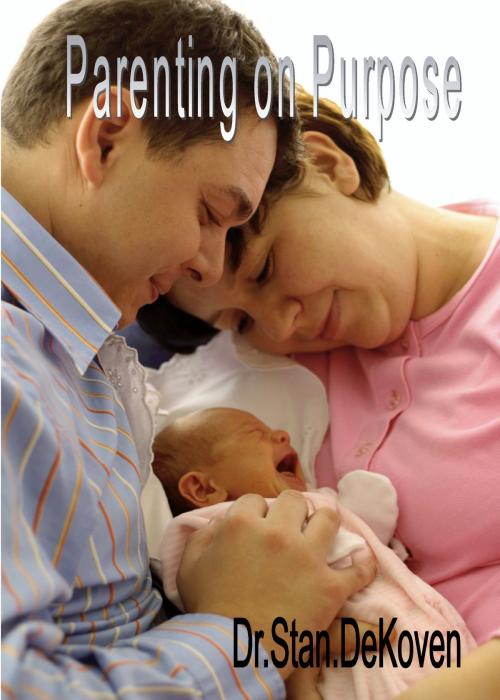| Author: | Stan DeKoven | ISBN: | 9781370968893 |
| Publisher: | Vision Colleges | Publication: | January 2, 2017 |
| Imprint: | Smashwords Edition | Language: | English |
| Author: | Stan DeKoven |
| ISBN: | 9781370968893 |
| Publisher: | Vision Colleges |
| Publication: | January 2, 2017 |
| Imprint: | Smashwords Edition |
| Language: | English |
It was with great delight that I read an article found in the Ladies Home Journal, dated July 1996. The title of the article is “Why Are Today’s Parents Such Wimps?” by Leslie Bennett. What a profound question. The article, written with keen insight and humor, presents only too true scenarios of frustrated parents and out of control children. Her premise is that all too often, children are running the home, rather than parents taking their proper place of prominence. She offers several reasons for this national phenomenon and some insightful solutions. They are worth noting.
First, parents today are under unique pressures. Parents are torn apart by the various demands of family and work responsibilities, and are often filled with guilt. Finding the time for childrearing is ever more challenging. The parents, because of the guilt they feel, are often unwilling to discipline their children for fear the children will resent or even hate them. They will therefore placate the child for the sake of peace and quite. Further, many baby boomers, raised in the “Me” generation, have learned permissiveness and passivity, as a response to the rebellion against previous generations. Unfortunately, this passivity and permissiveness has created insecurity in parents, to the place where action is absent when required for the proper care of children. In rejecting the parenting models of previous generations (some of which was not healthy, and deserved rejection!) where parents were authoritarian and ruled as benevolent (hopefully) dictators, parents of today have limited experience in parenting with effectiveness, seemingly lost as to what to do when Johnny says “NO!” Adding insult to injury, parents are depicted in the media as the brunt of adolescent jokes, having no clue as to what their children are doing or how to manage their impulsive and self absorbed behavior. Setting limits on children’s’ behavior has become a lost art form. To set limits is one of the most important of parenting tasks.
The author suggests (based upon Love & Limits by Crary) five major limits for healthy child rearing. They are: avoid problems when possible, by controlling the environment in advance of a potential problem, rewarding cooperation, acknowledging feelings, setting limits, and teaching new skills. Further, Gosman Spoiled Rotten: Today’s Children and How to Change Them (Villard, 1992) provides different insights, including communicate love, follow through with reasonable consequences, model self-esteem, devote lots of time to the child, and remember that the child who has everything appreciates nothing. Very good advice for today’s forlorn-ed parents.
Indeed, parenting in the modern world of today is an increasingly difficult task. Even within the church parents experience difficulty in knowing what is right to do in disciplining a child, and who to listen to for advice. The proliferation of experts on what should be a fairly delightful process (parenting) has not provided greater clarity, but has helped to muddy the waters.
It was with great delight that I read an article found in the Ladies Home Journal, dated July 1996. The title of the article is “Why Are Today’s Parents Such Wimps?” by Leslie Bennett. What a profound question. The article, written with keen insight and humor, presents only too true scenarios of frustrated parents and out of control children. Her premise is that all too often, children are running the home, rather than parents taking their proper place of prominence. She offers several reasons for this national phenomenon and some insightful solutions. They are worth noting.
First, parents today are under unique pressures. Parents are torn apart by the various demands of family and work responsibilities, and are often filled with guilt. Finding the time for childrearing is ever more challenging. The parents, because of the guilt they feel, are often unwilling to discipline their children for fear the children will resent or even hate them. They will therefore placate the child for the sake of peace and quite. Further, many baby boomers, raised in the “Me” generation, have learned permissiveness and passivity, as a response to the rebellion against previous generations. Unfortunately, this passivity and permissiveness has created insecurity in parents, to the place where action is absent when required for the proper care of children. In rejecting the parenting models of previous generations (some of which was not healthy, and deserved rejection!) where parents were authoritarian and ruled as benevolent (hopefully) dictators, parents of today have limited experience in parenting with effectiveness, seemingly lost as to what to do when Johnny says “NO!” Adding insult to injury, parents are depicted in the media as the brunt of adolescent jokes, having no clue as to what their children are doing or how to manage their impulsive and self absorbed behavior. Setting limits on children’s’ behavior has become a lost art form. To set limits is one of the most important of parenting tasks.
The author suggests (based upon Love & Limits by Crary) five major limits for healthy child rearing. They are: avoid problems when possible, by controlling the environment in advance of a potential problem, rewarding cooperation, acknowledging feelings, setting limits, and teaching new skills. Further, Gosman Spoiled Rotten: Today’s Children and How to Change Them (Villard, 1992) provides different insights, including communicate love, follow through with reasonable consequences, model self-esteem, devote lots of time to the child, and remember that the child who has everything appreciates nothing. Very good advice for today’s forlorn-ed parents.
Indeed, parenting in the modern world of today is an increasingly difficult task. Even within the church parents experience difficulty in knowing what is right to do in disciplining a child, and who to listen to for advice. The proliferation of experts on what should be a fairly delightful process (parenting) has not provided greater clarity, but has helped to muddy the waters.















